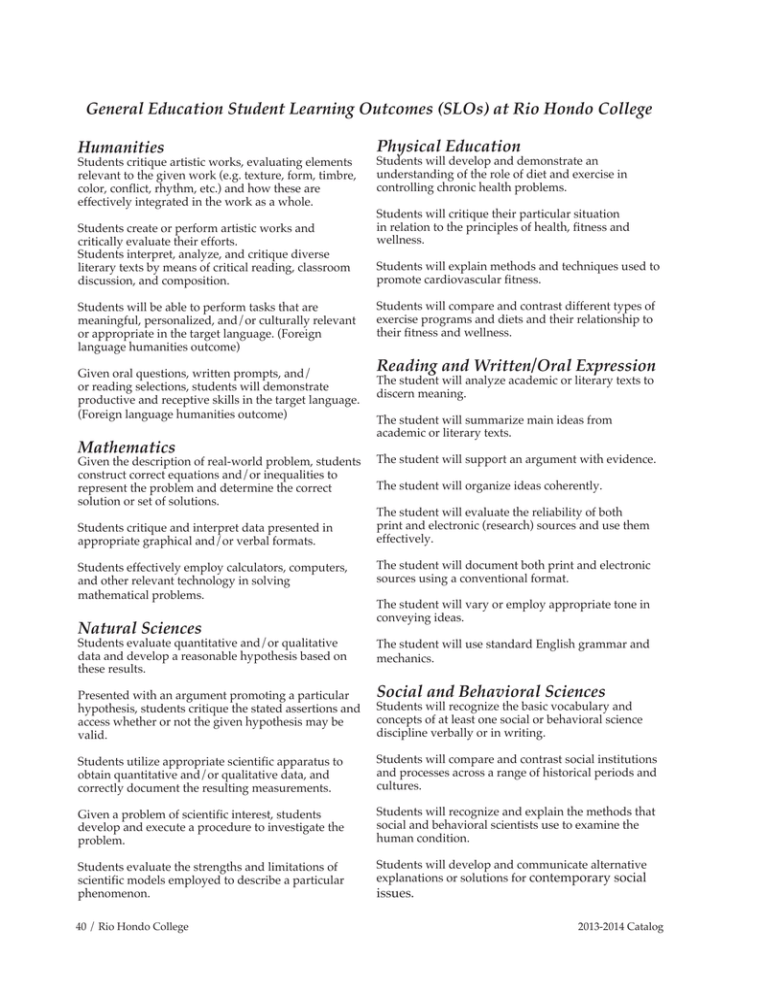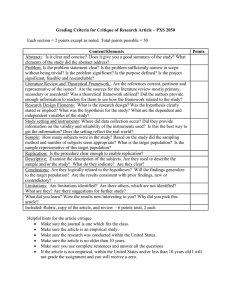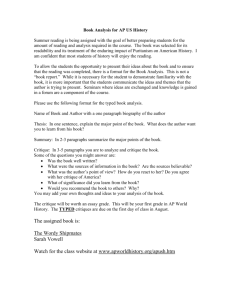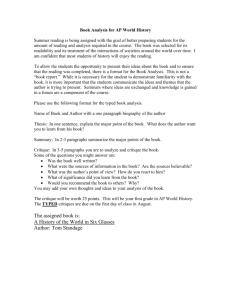General Education Student Learning Outcomes (SLOs) at Rio Hondo College Humanities
advertisement

General Education Student Learning Outcomes (SLOs) at Rio Hondo College Humanities Students critique artistic works, evaluating elements relevant to the given work (e.g. texture, form, timbre, color, conflict, rhythm, etc.) and how these are effectively integrated in the work as a whole. Students create or perform artistic works and critically evaluate their efforts. Students interpret, analyze, and critique diverse literary texts by means of critical reading, classroom discussion, and composition. Students will be able to perform tasks that are meaningful, personalized, and/or culturally relevant or appropriate in the target language. (Foreign language humanities outcome) Given oral questions, written prompts, and/ or reading selections, students will demonstrate productive and receptive skills in the target language. (Foreign language humanities outcome) Mathematics Given the description of real-world problem, students construct correct equations and/or inequalities to represent the problem and determine the correct solution or set of solutions. Students critique and interpret data presented in appropriate graphical and/or verbal formats. Students effectively employ calculators, computers, and other relevant technology in solving mathematical problems. Natural Sciences Physical Education Students will develop and demonstrate an understanding of the role of diet and exercise in controlling chronic health problems. Students will critique their particular situation in relation to the principles of health, fitness and wellness. Students will explain methods and techniques used to promote cardiovascular fitness. Students will compare and contrast different types of exercise programs and diets and their relationship to their fitness and wellness. Reading and Written/Oral Expression The student will analyze academic or literary texts to discern meaning. The student will summarize main ideas from academic or literary texts. The student will support an argument with evidence. The student will organize ideas coherently. The student will evaluate the reliability of both print and electronic (research) sources and use them effectively. The student will document both print and electronic sources using a conventional format. The student will vary or employ appropriate tone in conveying ideas. Students evaluate quantitative and/or qualitative data and develop a reasonable hypothesis based on these results. The student will use standard English grammar and mechanics. Presented with an argument promoting a particular hypothesis, students critique the stated assertions and access whether or not the given hypothesis may be valid. Students will recognize the basic vocabulary and concepts of at least one social or behavioral science discipline verbally or in writing. Social and Behavioral Sciences Students utilize appropriate scientific apparatus to obtain quantitative and/or qualitative data, and correctly document the resulting measurements. Students will compare and contrast social institutions and processes across a range of historical periods and cultures. Given a problem of scientific interest, students develop and execute a procedure to investigate the problem. Students will recognize and explain the methods that social and behavioral scientists use to examine the human condition. Students evaluate the strengths and limitations of scientific models employed to describe a particular phenomenon. Students will develop and communicate alternative explanations or solutions for contemporary social 40 / Rio Hondo College issues. 2013-2014 Catalog



